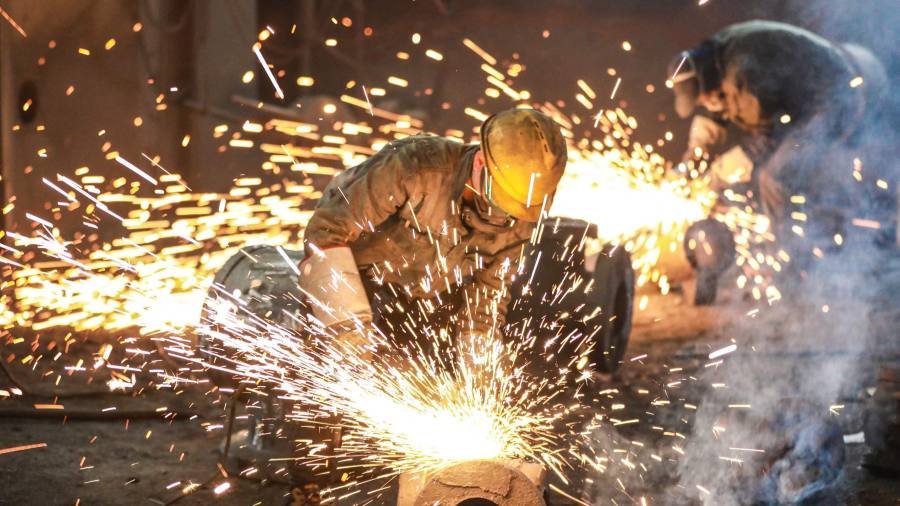There’s so much noise out there on how to navigate a challenging market. This April, let Inman help you cut through the clutter to make smart business decisions in real time. All month long, we’re taking it Back to Basics and finding out how real estate pros are evolving their systems and investing personally and professionally to drive growth.
Environment is everything. In the correct environment, your chances of success are high. In the wrong environment, your business could sputter, fail to thrive and even die.
Astronauts aboard the International Space Station understand one very important fact: They are completely dependent on the manmade environment inside the station. One misstep, calculation error or equipment failure could lead to death.
Put simply, their environment is critical.
For the astronauts, a carefully maintained environment is the foundation for everything they do. If something goes wrong, they cannot work or even live effectively. While it is easy to understand how essential environment is to those living in the unforgiving vacuum of space, complete with extreme cold, solar radiation and potential meteor strikes, we tend to forget that a proper environment is critical to our daily lives as well.
Are you setting appropriate boundaries on your environment?
Ironically, environments compete. As a parent, we want to provide a positive, nurturing environment for our children. We want to be there for them when needs arise, we want to remain accessible and do not want to convey that they are unwanted. But, for those Realtors who do most of their work in their home office — especially those with young children — the desire to provide a nurturing environment for their children can directly conflict with the environment needed to be successful in real estate.
To run an effective business, time blocking is critical. The ability to block out time for prospecting, training and other business-critical activities is often almost impossible with children underfoot. I’ve lost count of the number of Zoom calls I’ve had with agents where children are peeking in to catch a glimpse of what is on the screen, causing disturbances in other parts of the house and overall making it difficult for the agent to focus.
This is not just a “work-at-home” issue. As an example, prior to the pandemic, it was not unusual for a large number of our team to be in the office at the same time. Truth is, they loved being together and many of the times spent in proximity to each other resulted in significant amounts of noise and disruptions — particularly for the administrative staff.
The racket was wonderful; it signaled that the team enjoyed being together and were bonding effectively. It also had a dark side: It was extremely disruptive in a confined office space. It came to the point where our listing manager put a stop sign on a stand in front of her door when it was imperative that she not be bothered. Not long after, our Director of Operations followed suit.
Factor in email, calls, social media and so on, and it is amazing that many agents get any work done at all.
4 critical steps to ensure your environment is conducive to success
1. Determine the type of environment you need
Unlike the astronauts on the International Space Station, who require air, light, heat, protection from solar radiation and so on, we get to take those things for granted. Every task related to your work, however, comes with its own specific environmental needs. To ignore that fact is to set yourself up for failure.
Interestingly, the type of environment we need can change from task to task. We often assume that we can do everything pertinent to our job in one location or environment. That is simply not true.
Step one is to identify the task you need to perform and then figure out the optimum type of environment required to accomplish your task without interruption.
If we use your personal prospecting for clients as an example, you should have a quiet space with a computer, phone, pad of paper, scripts, call list, dialer and so on. Interestingly, if you are part of a team that is prospecting together to achieve a team goal — such as a Team Call Night — the best environment could be to have everyone in the same room dialing together to build rapport, key off each other’s energy and to celebrate appointments made or nurtures added.
2. Evaluate your current environment
In his landmark book Triggers, Marshall Goldsmith states, “Our environment is a nonstop triggering mechanism whose impact on our behavior is too significant to be ignored.” If set up correctly, your environment can be a force for good, propelling you to success. The opposite is true as well.
As an example, if you are working from home, have three active kids and are trying to prospect from your dining room table, your environment is setting you up for failure. Take the time to evaluate what needs to be done during your time blocks and then honestly evaluate what must happen or where you need to be to do the activities necessary for success.
In developing the idea of triggers, Goldsmith clarifies, “A behavioral trigger is any stimulus that impacts our behavior.” He goes on to explain that triggers fall into six categories:
A behavioral trigger can be direct or indirect
An example of a direct trigger would be one of your children falling and bloodying their knee: your immediate response would be to calm their crying and apply a bandage. An indirect trigger would be picking up the phone and calling a friend after seeing their post on Facebook.
A trigger can be internal or external
An external trigger is something that assails one of our five senses and prompts us to act. A sudden scream from a child is a common external trigger. An internal trigger is a thought that suddenly pops into your mind that causes a reaction.
A trigger can be conscious or unconscious
A conscious trigger is one you can easily identify: a funny example is in the movie Cool Runnings when the Jamaican bobsled team, having never experienced cold weather and snow, fly into Calgary, Canada, for the Winter Olympics and go through the door to the frozen outside. Their hilarious response is immediately identifiable.
An unconscious trigger would be the involuntary reaction of a person who wakes up and discovers that the rainy, gloomy weather they have lived through for the past 20 days will continue indefinitely. Without realizing it, the weather is affecting their attitude and demeanor.
A trigger can be anticipated or unanticipated
An anticipated trigger would be the knowledge that when picking a favorite relative up at the airport, the first response will be a hug. An unanticipated trigger would be trying to pick up their suitcase and discovering it was too heavy to easily lift, triggering your automatic response, “What the heck do you have in here?” followed by a search for a luggage cart.
A trigger can be encouraging or discouraging
A kind word of praise from an employer can lift an employee’s spirits and propel them to greater heights. A demeaning comment, on the other hand, can lead to despondency and the desire to find another job.
A trigger can be productive or counterproductive
A triggering event in your environment can lead you to more enthusiasm and productivity while a negative trigger could dampen your spirits and derail results. This last trigger is why environment is so important: If set up correctly, your environment can trigger you to more productive behavior.
If there are a lot of negative triggers, however, your attitude towards work can become extremely negative and you will actually begin to look for excuses to avoid the very behaviors that are required for you to be successful. As an example, if you keep getting interrupted while prospecting, you could begin to look for excuses to avoid it, thereby diminishing your chances of success.
This one gets me personally. I grew up in a poor environment where having enough food was an issue. Consequently, visits to buffets cause significant problems for me. Whereas most people go to a buffet to get full, I tend to store up for the winter. As a result, my wife has banned me from buffets.
We also do not buy snack foods or other munchies because I do not seem to have the willpower to avoid them. This leaves the fridge. As I am working, I occasionally need to stand up and stretch. Since my office is close to the kitchen, I typically wander through. The very act of walking through my kitchen, coupled with my food issues, triggers a counterproductive behavior: Opening the fridge door. It’s downhill from there.
When evaluating your current environment, it is important to not only look at the physical space (Is it a warm, well-lit place where you can perform your tasks uninterruptedly?) but also pay attention to the various triggers that might happen there. Understanding triggers will help you evaluate your environment and then shape it effectively.
3. Develop a conducive environment
I am a morning person. As I write this, I am the only one up, am in a quiet place, have ready access to my espresso machine and know I have a specific amount of uninterrupted time to write before I need to get on a Zoom call with my team for our daily morning Power Up.
I know that for me, the mornings are the most productive time of my day, so if effective writing is going to happen, it needs to be then. Energy is high and my brain is working effectively.
In contrast, in the evenings, my goal is to unwind and slow my brain to prepare for sleep. It would be an exercise in futility to do any writing then. I have tried it a few times and the result is me sitting there, staring blankly at the screen without being able to put two cohesive thoughts together.
A bookstore near us understood the idea of building a conducive environment. Keying off of Hemmingway’s short story, “A Clean Well-Lighted Place”, they named their bookstore, “A Clean Well-Lighted Place For Books.” The title identified the triggers necessary for selling books and, to further amplify their chances of success, they filled the space with comfortable chairs you could sit in to peruse a prospective purchase.
For me personally, addressing my fridge issues, I’m considering putting a lock on the door and giving my wife the key.
4. Protect your environment
If you were to hold a small piece of rock in your hand the size of a pea, it would appear to be completely innocuous. In space, however, that same pebble hurtling through the emptiness can cause extreme damage when impacting a manmade object. It can knock out a satellite, punch a hole in a space vehicle or even kill a person if it impacts their spacesuit.
The point is simple: It does not take much to disrupt your environment. While we all occasionally deal with significant events or emergencies, it is the small, the tiny, the mundane issues impacting our schedules that have the biggest effect. In and of themselves they appear harmless — a phone call, a text, an unexpected visitor, a sudden urge to snack. If allowed to impact your prospecting or other critical activities, however, they can quickly blow a hole in your schedule and derail your results.
In the same way a meteor strike on the International Space Station requires everyone’s immediate response, effectively halting the tasks at hand, unexpected interruptions do the same to your schedule and your goals.
Ironically, when interruptions come, they should not be a surprise. We all know that people call, text messages arrive, we get the munchies, things that must be done pop into our heads, kids will not stay quiet for long and so on. The problem is not that situations arise; it is how we handle them.
I live in a home that is approximately 100 years old that we are gradually bringing into the 21st century. There is no end to things that need to be done and I always have projects underway. It is not uncommon for me, in the middle of important activities, to suddenly remember details that need to be handled for my home.
On occasion, without thinking, I have found myself in the car headed to the hardware store. Truth is, I welcome the distraction. I prefer getting out and driving to sitting at my desk working. The problem, however, is that the task I was working on is usually way more important than the part waiting for me at the store, which can always be purchased later in conjunction with other items.
Those who get a lot done not only understand the importance of time blocking — they understand how to recognize triggers and put barriers in place to keep distractions from interrupting their routine. They turn off their phones, avoid emails, put a pad of paper on their desk to write down ideas as they pop into their heads and more. They do whatever they need to do to ensure that their time blocking is uninterrupted.
While this can be difficult at times — as an example, children can be relentless in their pursuit of your attention — with planning, protective measures can be put in place to allow time blocking to work.
Environment is critical: On the International Space Station it can spell the difference between life and death. When it comes to the life or death of your business, environment has the same effect. Those agents who succeed are most often the ones who understand how to effectively control their environment. Recognize it, manage it and then set the stage for success.
















